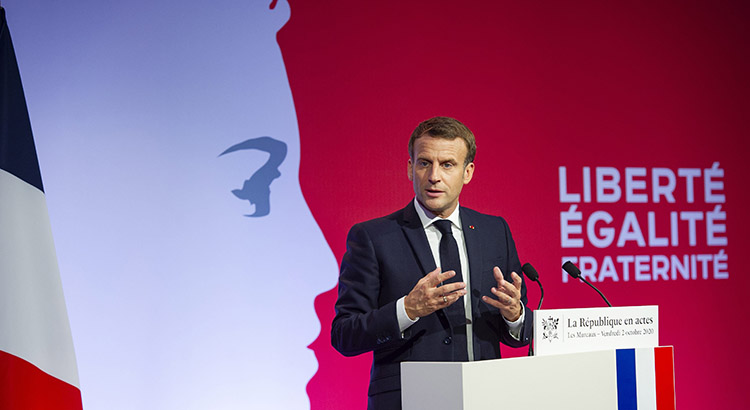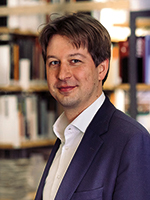On October 2nd French president Macron presented a five-point plan to address Islamist radicalization. The long awaited speech sparked debates in France and beyond. In Germany, some called it “historic” and a “wake-up call”, demanding a similar set of initiatives and central speech for the German debate. This is problematic for two reasons: first, while many measures in Macron’s plan are promising, others and the overall framing of the speech can prove counterproductive in terms of stigmatization and securitization. Second, the French centralist approach cannot and should not be transferred to the German federal and civil society-based system of preventing extremism.
Macron gave his speech in the suburb of Les Mureaux, north-west of Paris: A meaningful place, since it is one of fifteen cities where French authorities have been taking stronger action against radical Islamist tendencies – a fact to which Macron referred in his speech, pointing first and foremost to efforts by intelligence services, security forces and the judicial system since 2017. The extensive strategy presented in Les Mureaux is the result of three years of evaluating and reflecting on these joint efforts. It lays the groundwork for a range of regulatory initiatives – among them a draft law to be presented on 9 December that is said to aim at strengthening secularism as well as at consolidating and reinforcing republican principles. Since similar plans to rethink failed banlieues policies as well as to create a or the French Islam are being discussed for decades, Macron’s attempt might not be that novel – it is, however, in the European context currently the most ambitious agenda to counter Islamist radicalization. We discuss the main elements of Macron’s initiative and weigh some lessons Germany and other European countries should and shouldn’t learn from it.
Main premises of the speech
For Macron, the underlying problem is “Islamist separatism” being a “conscious, theorized, politico-religious project that manifests itself in repeated discrepancies with the values of the Republic.” To counter this problem Macron tries to both carve out the relevance of the problem in stark terms and introduce technocratic responses. This balancing act works only to some extent, since the two points tend to undermine each other: While in some parts, Macron soberly walks through key principles of the French republic and society (in particular, secularism and rule of law), the speech is quite combative at times: Macron stresses the necessity of “reconquering” specific districts with officials and civil servants serving as “fighters” against radicalism and of laying the groundwork for “[mobilizing] the nation for a republican awakening”.
The speech centers only on Islamist separatism, while the plural (“separatisms”) was originally discussed within the government to acknowledge that there are many extremisms and ideologies that distance themselves and even fight the societal and political order. This narrative of Islamists being a fundamental problem of French society turns up throughout the speech, with Macron occasionally conflating (radical) Islam, Islamism and extremism. The governmental prelude and follow-up of the speech did occasionally point to other ideologies that might run counter to the rule of law and social cohesion, but has hardly mitigated Macron’s focus on Islamism.
While Macron acknowledges the fact that the problem is (at least partially) homemade (a political failure and inadequate integration policies led to “ghettoization;” the formation of problematic milieus in banlieues; colonial past and traumas that the republic still needs to come to terms with), he also highlights transnational influences: foreign nationals, funding and ideas. At times, Macron portrays the republic and its main principles as being on the razor’s edge – thus undermining the more measured parts of the speech in which he outlines key measures of his plan.
Five lines of action
The centerpiece of the speech includes five points, whereof the first aims at restoring the neutrality of the public service and related actors as well as ensuring the maintenance of public order. Insisting on the principle of laicism and referencing the upcoming law, Macron announces a set of measures that will reinforce the obligation of neutrality for civil servants and expand it to further public employees and additional public spaces. With that Macron positions himself squarely in the French tradition of secularism but also nods to highly controversial, identity-based debates on headscarves and religious symbols in the public sphere – debates that are as controversial in France as they are in Germany (the “Kopftuchdebatte” or controversies about crucifixes in classrooms). While these German debates tend to occur on the level of the federal states, at times, they do have nation-wide repercussions. As we know from our own research, they can have mobilizing effects in radical milieus. Thus, whether Macron’s measures will have counterproductive effects depends on the precise wording and framing of the regulations.
Second, Macron targets associations and civil society institutions, making their public funding generally dependent upon their adherence to the republican principles of the French state. This results in financial monitoring and a repayment obligation in cases of non-adherence. As the laical tradition is one of strict neutrality of the state, the scope of the regulations should be watched closely. There is the potential for bureaucratic overreach into an area that is crucial for the prevention of radicalization: a vibrant civil society. Nonetheless, the main goal of tying federal funds to the adherence to basic principles of human rights and the rule of law is legitimate and important.
The third point, addressing schools and educational institutions as a whole, is contextualized by pointing to the fact that about 50.000 French children are home schooled – a number that is said to be rising each year. There are notable differences to Germany as France has wider exemptions to school obligations. With this speech, Macron portrays schools as a “collective treasure” that need to be protected by any and all means, and introduces a strong intervention: Starting with the 2021 school year, public education will be compulsory for everyone from the age of three onwards. Again, this constitutes a clear break with a longstanding French tradition but is, in essence, in line with many other European countries.
Fourth, Macron focuses on the state’s role in enabling an “enlightened Islam” (“Islam des Lumières”) compatible with laicism and that can thus serve as a partner in regulating common affairs. He aims at reducing influences from abroad, for example by making it (to some degree) mandatory for Imams to be partially trained in France and by curbing the influence of radical religious leaders from abroad. He proposes to closely monitor foreign financial influx into mosques and Islamist groups. Further, Macron announces new funding of cultural and scientific initiatives in order to broaden knowledge and to deepen the understanding of Islam in France. While there are similar debates and institutional reforms in Germany, the German approach is rather one of creating incentives and alternatives than of controlling or banning. Our research shows that traveling Imams and foreign financial investment can indeed be a source of trouble in radicalization dynamics. However, the role of conservative religious leaders is ambivalent and sometimes even helpful in disengagement and deradicalization processes.
As for the fifth and final argument, Macron points to the necessity of enforcing existing law(s) and restoring respect: Connecting back to radicalization and radical Islamist tendencies in specific milieus and banlieues, Macron announces the need to reclaim the “lost neighborhoods” and calls for a republican presence everywhere, understood mostly in terms of security. Again, the speech turns combative, as Macron states: “Where we have withdrawn, we must return.” The banlieues and ghettoization certainly are fundamental challenges for France. Indeed, the aspect of state presence and authority within these partially isolated milieus is an important measure in this regard. However, a grand strategy would engage more critically and directly with rethinking past measures that led to the very emergence of those banlieues in the first place. Any corrections will be painfully slow, but this is where the emphasis should lie when countering separatism: creating cohesion and integration, rather than further entrenching separation.
Helpful ambition, ambivalent measures
The starting points and problem descriptions are quite similar in France and Germany, but the institutional structures and the overall framing are quite different. The German debate is much more pluralistic and the actual societal challenges from Islamist groups smaller than in France. There is also an increasing acknowledgment that singling out one religion or group might lead to stigmatization effects that might fuel mobilization and radicalization in those problematic milieus in particular. In addition, years of focusing on Islamist groups certainly coincided with losing sight of much larger societal problems in Germany and across Europe: right-wing extremism and co-escalation dynamics between various extremist groups. And this holds true for France as well: right-wing violence and Islamophobia are on the rise, leading to an increasing risk of further polarization.
The measures Macron outlines are useful on the surface, in particular with regard to those parts that link to the centrality of the education sector and the reassessment of former policies, such as measures against discrimination in employment and housing. However, much will depend on their ultimate implementation, as the speech conceivably lays the groundwork for both reasonable approaches and counterproductive overreach. Many European societies and actors engaged in prevention work have learned the lesson that an overemphasis of control, bans and security-related measures and approaches and rhetoric that lead to the (unintended) stigmatization of single groups are not helpful. A plurality of approaches as put forward by a vibrant and colorful civil society, the focus on the education system, and an acknowledgment of the transnational nature of so many societal dynamics are key in curbing the influence of extremists and coping with the challenges to liberal democracies. Nonetheless, Macron’s speech is helpful in its holistic ambition: proposing a set of measures, balancing them in one agenda and weaving them into a principled and historic narrative is important for legitimacy, reflection and for communication.
This Article has also been published as part of the GNET Blog series.



